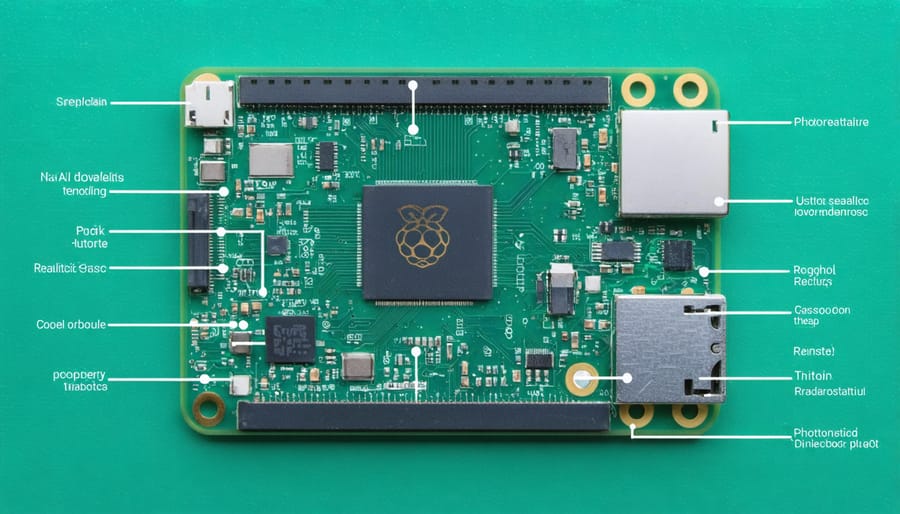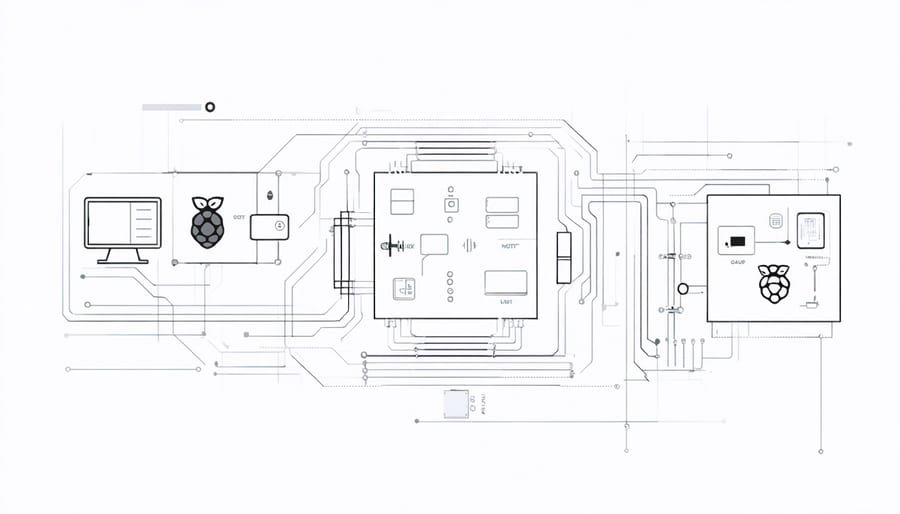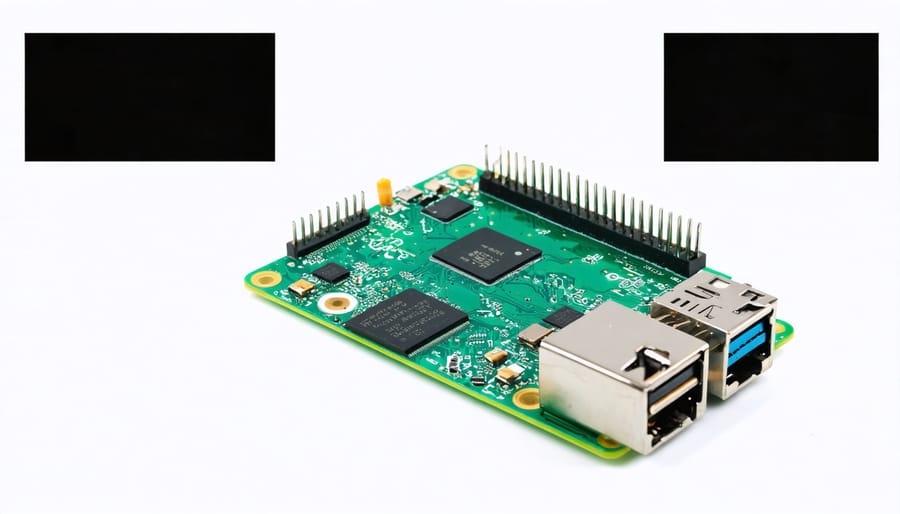Unleash the power of edge AI with the revolutionary Raspberry Pi AI module, a groundbreaking fusion of compact computing and artificial intelligence. This game-changing technology empowers tech enthusiasts, hobbyists, and educators to explore the frontiers of AI applications, from smart home automation to intelligent robotics. With its cutting-edge neural processing capabilities and seamless integration with the beloved Raspberry Pi ecosystem, the AI module opens up a world of possibilities for innovative projects and hands-on learning experiences. Discover how this pocket-sized powerhouse is transforming the landscape of edge computing and paving the way for a new era of accessible, intelligent solutions that push the boundaries of what’s possible with Raspberry Pi.
What is the Raspberry Pi AI Module?
Technical Specifications
The Raspberry Pi AI module is a powerful addition to the Raspberry Pi ecosystem, featuring a custom-designed processor optimized for edge AI applications. At the heart of the module is the Raspberry Pi RP2040 microcontroller, a dual-core Arm Cortex-M0+ processor running at up to 133 MHz. This processor is accompanied by 264KB of on-chip SRAM and 16MB of off-chip QSPI flash memory, providing ample storage for AI models and application code.
The module also includes a dedicated Neural Processing Unit (NPU) capable of delivering up to 2 TOPS (trillion operations per second) of AI performance. This NPU is designed to efficiently handle common AI workloads such as image classification, object detection, and speech recognition, enabling real-time AI inference at the edge.
In terms of I/O, the AI module offers a wide range of options. It features a MIPI CSI-2 camera interface, allowing users to connect compatible cameras for computer vision applications. The module also includes a PCIe interface, enabling high-speed connectivity to external peripherals and expansion boards.
Other notable hardware components include a secure element for cryptographic operations, a power management IC for efficient power delivery, and a temperature sensor for thermal monitoring. The module is designed to be pin-compatible with the Raspberry Pi 4, ensuring easy integration with existing projects and accessories.

Software Compatibility
The Raspberry Pi AI module is compatible with a wide range of popular operating systems, frameworks, and programming languages. It supports Linux-based operating systems such as Raspberry Pi OS, Ubuntu, and Debian, making it easy to integrate with existing Raspberry Pi setups. The module also works seamlessly with popular AI frameworks like TensorFlow, PyTorch, and Caffe, enabling developers to leverage pre-trained models or create custom AI applications. Python, the go-to language for AI development, is fully supported, along with other languages like C++ and Java. This extensive compatibility ensures that developers can utilize their preferred tools and libraries to build powerful edge AI solutions with the Raspberry Pi AI module.
Edge AI Applications

Smart Home Devices
The Raspberry Pi AI module opens up exciting possibilities for creating intelligent home automation and IoT devices. By leveraging the module’s edge AI capabilities, you can develop smart home solutions that process data locally, ensuring faster response times and enhanced privacy. From voice-controlled lighting systems to intelligent security cameras, the AI module empowers you to build innovative projects that make your home more convenient, efficient, and secure. Imagine a smart thermostat that learns your preferences and optimizes energy consumption, or a home automation hub that seamlessly integrates various devices and sensors. With the Raspberry Pi AI module, you can bring these ideas to life and customize your living space like never before. Whether you’re a beginner or an experienced maker, the module provides a powerful platform to explore the world of intelligent home automation and IoT.
Robotics and Autonomous Systems
The Raspberry Pi AI module opens up exciting possibilities in the realm of robotics and autonomous systems. With its powerful edge AI capabilities, this compact device can serve as the brain behind intelligent robots, drones, and even self-driving vehicles. Imagine building a robot that can navigate its surroundings, recognize objects, and make decisions based on real-time data processing. The AI module’s low power consumption and high performance make it an ideal choice for mobile robotic applications. You can experiment with various machine learning projects, such as obstacle avoidance, gesture recognition, or autonomous navigation. For those new to this field, our guide on machine learning projects can provide inspiration and guidance. Whether you’re a hobbyist looking to create your own smart robot or an educator teaching the fundamentals of robotics, the Raspberry Pi AI module provides an accessible and versatile platform to bring your ideas to life.
Industrial IoT and Predictive Maintenance
The Raspberry Pi AI module opens up exciting possibilities for industrial IoT applications, particularly in the realm of predictive maintenance. By leveraging the module’s edge AI capabilities, manufacturers can monitor equipment health in real-time, detecting anomalies and predicting potential failures before they occur. This proactive approach minimizes downtime, reduces maintenance costs, and improves overall operational efficiency. In logistics, the AI module can be used to optimize supply chain management by analyzing sensor data from warehouses, vehicles, and inventory systems. By making data-driven decisions, businesses can streamline their operations, reduce waste, and enhance customer satisfaction. As the industrial IoT continues to evolve, the Raspberry Pi AI module, akin to how Raspberry Pi models revolutionize industrial automation, is poised to play a significant role in shaping the future of connected manufacturing and logistics.
Getting Started with the Raspberry Pi AI Module
Hardware Setup
To set up your Raspberry Pi AI module, start by connecting the module to the Raspberry Pi’s GPIO pins, ensuring proper alignment. Next, attach the camera module to the dedicated camera connector on the Raspberry Pi board. If you plan to use a display, connect it to the HDMI port. For audio input or output, use the 3.5mm audio jack or USB ports for external devices. Connect a keyboard and mouse to the USB ports for easy navigation and control. Ensure your Raspberry Pi is powered through the USB-C power input using an appropriate power supply. Once all peripherals are connected, insert a microSD card with the desired operating system and AI software preloaded. Double-check all connections before powering on your Raspberry Pi. With the hardware set up, you’re ready to dive into the exciting world of edge AI applications using your Raspberry Pi AI module.
Software Installation and Configuration
To get started with the Raspberry Pi AI module, you’ll need to install the necessary software components. Begin by downloading the latest version of the Raspberry Pi OS from the official website and flashing it onto a microSD card using a tool like Balena Etcher. Once the OS is installed, boot up your Raspberry Pi and connect it to the internet.
Next, open a terminal and update the system packages by running “sudo apt update” and “sudo apt upgrade”. Install the required drivers for the AI module, such as the camera driver and the Tensorflow Lite runtime. You can find detailed instructions for this process in the official documentation.
Finally, set up the necessary frameworks and libraries for your AI projects. Install Python and pip, then use pip to install OpenCV, Tensorflow, and other relevant packages. Test your setup by running a simple AI inference script to ensure everything is working correctly. For guidance on optimizing your Raspberry Pi, consider exploring guides on running a Raspberry Pi server to complement your setup. With these steps completed, you’re ready to start exploring the exciting world of edge AI with your Raspberry Pi AI module.

Beginner-Friendly AI Projects
Here are some beginner-friendly AI projects to help you get started with the Raspberry Pi AI module:
1. Object detection: Use the module’s camera and pre-trained models to detect and identify objects in real-time. Follow our step-by-step tutorial to set up the software and run your first object detection project.
2. Voice assistant: Create your own voice-controlled assistant using the AI module’s microphone and natural language processing capabilities. Our guide walks you through the process of training the model and integrating it with your Raspberry Pi.
3. Sentiment analysis: Build a simple sentiment analysis tool that can classify text as positive, negative, or neutral. This project is perfect for learning about text processing and machine learning basics.
4. Face recognition: Develop a face recognition system that can identify individuals based on their facial features. Our tutorial covers data collection, model training, and deployment on the AI module.
Conclusion
The Raspberry Pi AI module marks a significant milestone in the democratization of artificial intelligence, making it more accessible and affordable for a wide range of users. By combining the power of edge computing with the versatility and ease-of-use of the Raspberry Pi platform, this module opens up a world of possibilities for developers, researchers, and hobbyists alike.
As the demand for AI-driven solutions continues to grow across various industries, the Raspberry Pi AI module is poised to play a crucial role in enabling the development of innovative applications that can process data locally, reducing latency and enhancing privacy. From smart home devices and robotics to industrial automation and beyond, the potential use cases for this module are virtually limitless.
Moreover, the Raspberry Pi AI module serves as an excellent educational tool, allowing students and beginners to dive into the world of artificial intelligence and gain hands-on experience with cutting-edge technology. As the AI landscape continues to evolve at a rapid pace, the skills and knowledge gained through working with this module will prove invaluable in shaping the future of edge computing and AI-driven innovation.
In conclusion, the Raspberry Pi AI module represents a powerful and accessible solution for anyone looking to explore the exciting world of edge AI. With its impressive capabilities and vast potential, this module is set to revolutionize the way we approach AI development and deployment, paving the way for a future where intelligent devices are seamlessly integrated into our daily lives.


